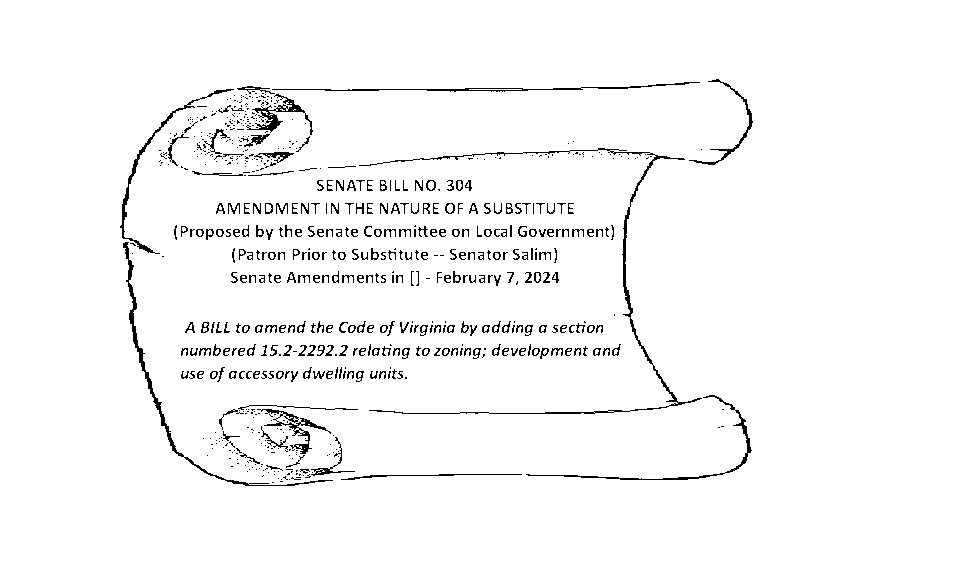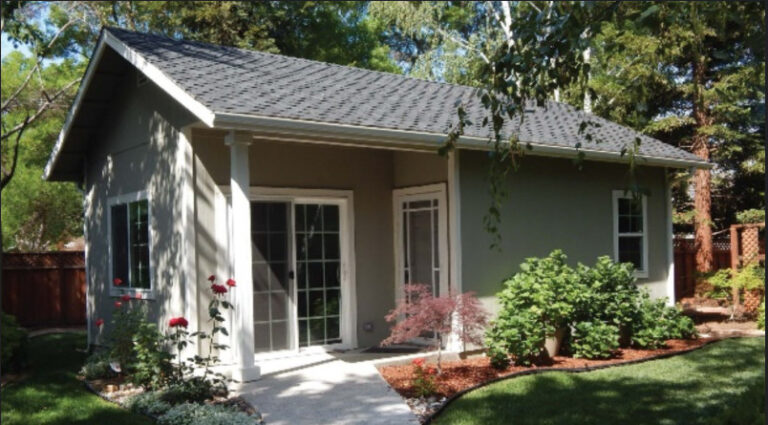Senate Bill SB 304 on Accessory Dwelling Units: How Would It Affect Falls Church?
Update: Deferral to 2025
February 24, 2024
Substantial changes were made within the Virginia Senate to Senator Salim’s proposed bill to deem that accessory dwellings (whether internal, attached, or detached) can be built by-right within single-family residential districts throughout the state (SB 304). The bill passed the Senate on a 22-18 vote.
In the Virginia House of Delegates, local governments argued they need the authority to assure that the development of new housing does not overwhelm schools, streets, and sewer and water systems. On February 23, after involvement by the Speaker of the House, a further revision of the bill was deferred to 2025 by the House Counties, Cities and Towns Committee. In the interim, the Committee called upon the Virginia Housing Commission for a review of accessory dwelling unit practices.
Reference:
- Bill on mother-in-law suites put on ice, as Virginia House speaker steps in, SWVA Today, February 23, 2024.
- Amended Senate Bill No. 304, February 23, 2024
Summary
February 9, 2024
State Senator Saddam Salim introduced a bill, SB 304, on January 10, 2024, that would:
- mandate that residential zoning districts throughout the state be deemed to include accessory dwelling units (ADU) as a permitted accessory use, whether internal, attached, or detached in nature and
- prohibit any requirement for a special use permit for an ADU or compliance with any other requirements except as provided in the bill.
- specify provisions that localities may require and those that they shall not require with regard to accessory dwellings, effectively removing flexibility in decision-making from county and city governments on these issues.

The City Council had an initial discussion on the proposed bill at its January 22, 2024, meeting. Several Council members expressed concern about the implied loss of sovereignty on zoning issues, and the precedent it would set. While others supported the concept of common regulations, the Council decided to encourage a state study of the issue rather than supporting the proposed legislation.
Following discussion and amendment by the Senate Committee on Local Government, this bill was passed on the Senate floor, 22-18, on February 9, 2024. A summary of the bill, as amended on February 8, is available here. Senator Salim will be in Falls Church City Council Chambers on Saturday, February 10, at 1:00 pm, for a public town hall where he will answer questions about this and other measures before the Senate.
Sovereignty concerns
Cindy Mester, in introducing the bill coming soon before the General Assembly, noted the intent to increase housing options and therefore affordability, but highlighted the City’s natural concern when dealing with Richmond to protect local authority over zoning, health, and safety. She had talked to individual Council members and found three inclined to support the legislation, two opposed on local authority grounds, and two inclined to seek a study.
Councilmember David Snyder said the bill was a broad and detailed preemption of an effort that the City has begun to discuss, undercutting the authority of the Council and Planning Commission. He suggested supporting a longer-term study but would retain the ability to make the critical decisions here for our own citizens based upon our own realities.
Councilmember Justine Underhill expressed an interest in better understanding how this bill compares with steps Arlington and Washington, DC have undertaken; she would offer conditional support if their ordinances were consistent with this bill. She recognized concerns about stressing traffic, utilities, and schools but encouraged a regional approach to solving housing problems, as reflected in this bill. She contended that the bill left control in local hands to devise their own approaches and therefore supported it conditionally.
Councilmember Caroline Lian said she would welcome any policy at the state level that encourages the production of housing units, due to the current housing crisis. She said eight states allow and support ADUs at the state level. Ms. Lian believes that there is benefit in doing a study conducted by an organization with very deep expertise in housing policy and suggests that there be some flexibility for local controls.
Councilmember Erin Flynn said she thought citizens would be surprised if the Council supported the bill without having the essential public engagement first. She noted the significant differences among neighboring communities on ADUs, and said she wouldn’t support the bill but could see the benefit of a state study.
Councilmember Marybeth Connelly said she was very intrigued with ADUs but emphasized the importance of community conversations. She thought it was unusual for Richmond to require localities to do specific things, but could support a study.
Vice Mayor Debbie Schantz-Hiscott said we should work with Arlington and Alexandria on ADUs to see what they have done but recognized that different jurisdictions might have different needs. She also supported a study while we make our own decisions on this issue. (Read our post Accessory Dwelling Units Will Be a Key Focus of City Planning in 2024. What Are They? What Are Other Jurisdictions Doing?)
Mayor Letty Hardi took the bill as a signal that we should all be moving ahead on ADUs and expected this will be a work plan issue for discussion at the Council retreat. She welcomed the ability for local authorities to address massing, building codes, water, sewer, septic, and stormwater. She suggested providing additional parameters for local authority, while supporting getting a study at the General Assembly level.
Amended version of SB 304
The Virginia Senate Committee on Local Government passed an amended version of the proposed bill on February 7 that substantially expanded the permissible requirements for localities, including dedicated parking for the ADU and owner occupancy of the ADU or the primary dwelling, as currently required in some jurisdictions. The amended bill also reduces the number of prohibited requirements, but now would prohibit a side or rear setback to be greater than that of an accessory structure. Falls Church requires side and rear setbacks of only 3 ft.
How does the amended bill compare with current City authorities?
Falls Church has included in its municipal code the potential for a special use permit for an accessory dwelling unit “which is in the same structure as, under the same ownership as, and subordinate to a one-family dwelling.” (Section 48-2(c))
Key differences with the amended bill are as follows:
- A detached dwelling is not currently allowed in the Falls Church code, but would be deemed to be included in zoning ordinances for residential districts under the proposed bill.
- A special use permit is required under the current Falls Church provisions, but would be prohibited by the proposed Senate bill.
- The Falls Church code does not address rental use, whereas the amended bill would permit localities to require that rentals extend for 30 days or more.
- The maximum footprint for an ADU in Falls Church is one-half that of the floor space of the primary dwelling, whereas the amended bill would permit localities to limit the ADU square footage to 1,500 square feet or one-half that of the primary dwelling, whichever is less.
- The building inspector determines the number of potential occupants in Falls Church, while how many people may live in an ADU is not mentioned in the proposed bill.
References
- January 22, 2024 City Council Meeting, video and agenda. Note that this video will not display properly on a small screen.
- January 22, 2024, City Council Meeting, YouTube video.
- Senate Bill No. 304, January 10, 2024
- Amended Senate Bill No. 304, February 9, 2024.
- Falls Church Municode Division 2, Sec. 48-236 (11) R-1A, Low Density Residential District


